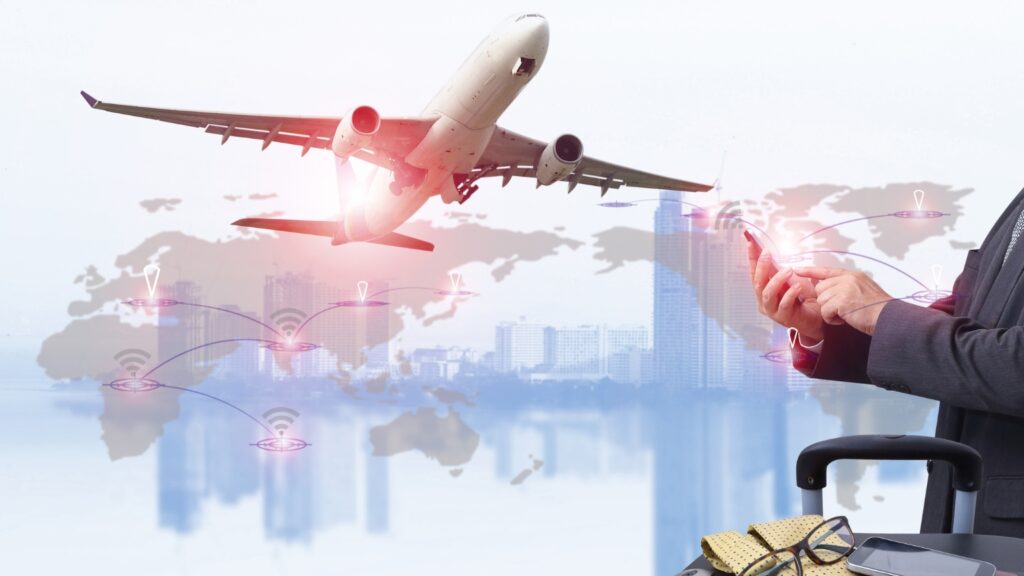Artificial Intelligence (AI) has become a transformative force across various industries, and the travel industry is no exception. From personalized travel recommendations to intelligent customer service, AI is revolutionizing the way we plan, book, and experience travel. This article explores the myriad ways in which AI is reshaping the travel industry, enhancing efficiency, personalization, and customer satisfaction. We’ll delve into key areas such as AI-powered customer service, personalized travel experiences, predictive analytics, and smart travel management. Additionally, we’ll consider the potential concerns and cautions associated with the overuse of AI in the travel industry.
AI-Powered Customer Service

Instant Responses and 24/7 Support
AI-powered customer service has dramatically improved the efficiency and responsiveness of travel companies. Chatbots and virtual assistants, equipped with sophisticated Natural Language Processing (NLP) capabilities, provide instant responses to customer queries, assist with bookings, and offer 24/7 support. For example, platforms like Skyscanner and Booking.com utilize chatbots to streamline customer interactions, reducing wait times and improving service quality. KLM’s AI-powered service, BlueBot, can interpret and respond to questions in multiple languages, providing a seamless global customer experience.
Handling Complex Interactions
AI-powered customer service is not limited to basic queries. Advanced AI systems can handle complex interactions, such as managing flight cancellations, rebooking tickets, and providing travel advisories. This level of service was particularly beneficial during the COVID-19 pandemic, when travel regulations were frequently changing. AI systems enabled airlines and travel agencies to keep customers informed and provide timely assistance, thereby enhancing customer trust and satisfaction.
Personalized Travel Experiences

Personalized Recommendations
AI has revolutionized the way travel companies offer personalized experiences to their customers. By analysing user data, such as past travel behaviour, preferences, and social media activity, AI algorithms can provide highly personalized travel recommendations. For instance, Airbnb uses AI to curate unique travel experiences tailored to each user, suggesting destinations, activities, and accommodations that match individual tastes.
Dynamic Pricing
Another significant innovation is dynamic pricing. AI-driven dynamic pricing models adjust the cost of travel services in real time based on demand, booking patterns, and market trends. This ensures competitive pricing and can offer personalized discounts to loyal customers. Airlines and hotels use dynamic pricing to optimize revenue and fill seats or rooms during off-peak times. For example, companies like Lufthansa and Hilton Hotels employ AI to adjust prices dynamically, ensuring maximum occupancy and profitability.
Enhanced In-Travel Experience
AI also enhances the in-travel experience. Smart assistants, integrated into travel apps, can provide real-time recommendations for dining, sightseeing, and entertainment based on the traveller’s current location and preferences. This level of personalization makes travel more enjoyable and hassle-free, as travellers receive tailored suggestions without needing to spend time researching options.
Predictive Analytics

Demand Forecasting
Predictive analytics powered by AI are transforming the travel industry by providing valuable insights and foresight. AI helps travel companies forecast demand more accurately by analysing historical data and current market trends. This allows businesses to manage inventory, staffing, and marketing strategies more effectively. For instance, airlines like Delta and United use AI to predict flight demand, ensuring optimal resource allocation and improving operational efficiency.
Predicting Travel Disruptions
Predictive analytics also play a crucial role in predicting travel disruptions. AI can analyse vast amounts of data, including weather patterns, air traffic, and historical delay information, to foresee potential disruptions. This allows airlines and travel agencies to proactively manage issues, providing customers with timely updates and alternative options. During adverse weather conditions or peak travel seasons, this capability is invaluable in minimizing inconvenience for travellers.
Predictive Maintenance
Furthermore, AI-driven predictive maintenance is enhancing the reliability and safety of travel. Airlines use AI to monitor aircraft health, predicting potential maintenance issues before they become critical. This not only improves safety but also reduces downtime and operational costs. Companies like Rolls-Royce are at the forefront of this technology, using AI to monitor engine performance and predict maintenance needs.
Smart Travel Management

Seamless Booking Processes
AI is streamlining travel management by integrating various travel services into a single, user-friendly platform. Virtual travel agents can book flights, hotels, and activities in one go, reducing the hassle of coordinating multiple reservations. Google Travel and TripActions are leading examples of platforms utilizing AI for seamless travel management. These platforms use AI to analyse user preferences and past behaviours to offer tailored travel itineraries, making the planning process more efficient and enjoyable.
Enhancing Safety and Security
In addition to booking, AI enhances travel safety and security through advanced screening technologies and real-time monitoring. Airports use AI-powered facial recognition systems to streamline passenger identification and improve security checks. For example, Singapore’s Changi Airport employs AI to enhance passenger processing efficiency, reducing wait times and improving the overall travel experience. AI also helps in analysing travel advisories and providing real-time safety updates to travellers, ensuring they are well-informed about their destinations.
Promoting Environmental Sustainability
Moreover, AI is playing a critical role in environmental sustainability within the travel industry. Smart algorithms help optimize flight routes and reduce fuel consumption, thereby minimizing the carbon footprint of air travel. Companies like Amadeus are using AI to develop sustainable travel solutions, promoting eco-friendly practices and helping travellers make environmentally conscious choices.
Concerns and Cautions with AI in Travel

Data Privacy
While AI offers numerous benefits, there are also concerns and potential drawbacks to consider. One major concern is data privacy. The use of AI in the travel industry involves collecting and analysing vast amounts of personal data. Ensuring this data is handled securely and transparently is crucial to maintaining customer trust. Travel companies must adhere to stringent data protection regulations, such as GDPR, to safeguard user information.
Job Displacement
Another concern is the potential for job displacement. As AI systems become more capable, there is a risk that certain roles, particularly in customer service and operational management, may be reduced or eliminated. This could lead to job losses and require workers to adapt to new roles that involve managing and working alongside AI technologies.
Over-Reliance on AI
Additionally, there is a risk of over-reliance on AI. While AI can handle many tasks efficiently, it is not infallible. Technical glitches or incorrect data interpretations can lead to significant disruptions. Travel companies must ensure there are robust backup systems and human oversight to mitigate such risks.
Ethical Implications
Finally, the ethical implications of AI must be considered. Issues such as algorithmic bias can affect decision-making processes, leading to unfair or discriminatory practices. It is essential for travel companies to implement ethical AI practices, ensuring their systems are fair, transparent, and accountable.
Conclusion

AI is undoubtedly transforming the travel industry, bringing about significant improvements in efficiency, personalization, and customer satisfaction. From AI-powered customer service and personalized travel experiences to predictive analytics and smart travel management, the impact of AI is far-reaching. However, it is crucial to address the potential concerns and ethical considerations associated with AI to ensure its benefits are realized responsibly.
As technology continues to evolve, the travel industry will witness even more innovative applications of AI, promising a future where travel is more seamless, enjoyable, and tailored to individual needs. Embracing these advancements will be crucial for travel companies to stay competitive and meet the ever-changing demands of modern travellers. The future of travel, powered by AI, holds immense potential, and with careful implementation, it will lead to a more connected and enhanced travel experience for all.




